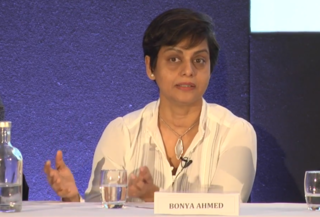Related Research Articles

Humanists International is an international non-governmental organisation championing secularism and human rights, motivated by secular humanist values. Founded in Amsterdam in 1952, it is an umbrella organisation made up of more than 160 secular humanist, atheist, rationalist, agnostic, skeptic, freethought and Ethical Culture organisations from over 80 countries.

Harkat-ul-Jihad-al-Islami is a Pakistani Islamist extremist, fundamentalist and terrorist organisation affiliated with Al-Qaeda and the Taliban.

Lesbian, gay, bisexual, transgender, and queer (LGBTQ) people in Bangladesh face widespread social and legal challenges not experienced by non-LGBTQ people.
The United Nations categorizes Bangladesh as a moderate democratic Muslim country. Sunni Islam is the largest and most dominant religion practiced in the country. In the Constitution of Bangladesh, Islam is referred to twice in the introduction and Part I of the constitution. The document begins with the Islamic phrase Bismillahir Rahmanir Raheem which in English is translated as "In the name of Allah, the Beneficent, the Merciful" and article (2A) declares that:"Islam is the state religion of the republic".

On 5 February 2013, protests ignited in Shahbagh, Bangladesh, fueled by the call for the execution of the convicted war criminal Abdul Quader Mollah. Previously sentenced to life imprisonment, Mollah was convicted on five of six counts of war crimes by the International Crimes Tribunal of Bangladesh. Mollah supported the West Pakistan during the 1971 Bangladesh Liberation War and played a crucial role in the murder of numerous Bengali nationalists and intellectuals. The demonstrations also sought the government's ban on the radical right-wing and conservative-Islamist group, Jamaat-e-Islami from participating in politics, including elections, and a boycott of institutions supporting or affiliated with the group.
Ahmed Rajib Haider was a Bangladeshi atheist blogger. He used to blog in the blogging communities namely somewhereinblog.net, amarblog.com and nagorikblog.com and used the pseudonym Thaba Baba.

The Ansarullah Bangla Team (ABT) (Bengali: আনসারুল্লাহ বাংলা টিম), also known as Ansar-al Islam Bangladesh/Ansar Bangla is an islamic organization in Bangladesh, implicated in crimes including some brutal attacks and murders of atheist bloggers from 2013 to 2015 and a bank heist in April 2015. The gang was outlawed days after the bank robbery by the Ministry of Home Affairs on 25 May 2015. The group has been claimed by police to be linked to Islami Chhatra Shibir, the student wing of Jamaat-e-Islami party in Bangladesh.
The Worldwide Protests for Free Expression in Bangladesh were a series of rallies outside Bangladeshi embassies and consulates to demand the release of four Bangladeshi bloggers who had been arrested on charges of blasphemy. The protests took place on 25 April – 2 May 2013 and were organised by the Center for Inquiry (CFI), American Atheists, and the International Humanist and Ethical Union. Demonstrations were held in Dhaka, New York City, Washington, D.C., London, Ottawa and other cities around the world. Secularists sought to express their solidarity with those jailed for speaking their minds about religion. Protesters drew attention to those who were being persecuted for exercising free speech, seeking to convince the international community to exert influence to have the bloggers set free by the Bangladeshi government.

Pak Sar Jamin Sad Bad is a 2004 Bangladeshi Bengali novel, written by Humayun Azad. The novel is based on an imagined Islamic fundamentalist political party that wants to make Bangladesh a Sharia law based Islamic state.
Irreligion in Bangladesh is rare and uncommon publicly. A Gallup survey conducted between 2014 – 2015 found that approximately 5% of Bangladeshis were non religious and less than 1% identified as convinced atheists. Bangladesh has 157.8 million people as of 2015 estimation.
Avijit Roy was a Bangladeshi-American engineer, online activist, writer, and blogger known for creating and administrating the Mukto-Mona, an Internet blogging community for Bangladeshi freethinkers, rationalists, skeptics, atheists, and humanists. Roy was an advocate of free expression in Bangladesh and coordinated international protests against government censorship and imprisonment of atheist bloggers. He was killed by machete-wielding assailants in Dhaka, Bangladesh, on 26 February 2015; the Islamic militant organization Ansarullah Bangla Team claimed responsibility for the attack.

Asif Mohiuddin is a Bangladeshi atheist and secular activist, religious critic and feminist. In 2012, he won The Bobs-Best of Online Activism award from Deutsche Welle, who stated that "Asif's blog was one of the most read web pages in Bangladesh and is known for its strong criticism of Islamic fundamentalism in Bangladesh's "anti-people politics", his blog was later blocked and banned in Bangladesh by its government. On 15 January 2013, he survived an assassination attempt by Islamic extremists. A few months later, he was imprisoned twice by the Bangladesh Government for posting "offensive comments about Islam and Mohammad". Due to sustained international pressure, Mohiuddin was released, after which he fled from his country to Germany in 2014. In 2015, he received the Anna Politkovskaya Prize for Journalism, awarded by Italian magazine Internazionale.

Rafida Bonya Ahmed is a Bangladeshi-American who is simultaneously a writer, free-spirited blogger and humanitarian activist, and a former IT official in the United States. In 2020, she founded the educational channels Think Bangla and Think English on YouTube.
Attacks by fundamentalists in Bangladesh refers to a period of turbulence in Bangladesh between 2013 and 2016 where attacks on a number of secularist and atheist writers, bloggers, and publishers in Bangladesh; foreigners; homosexuals; and religious minorities such as Hindus, Buddhists, Christians and Ahmadis were seen as having attacked Islam and Muhammad with many killed by Muslim extremists in retaliation. By 2 July 2016 a total of 48 people, including 20 foreign nationals, were killed in such attacks. These attacks were largely blamed on extremist groups such as Ansarullah Bangla Team and Islamic State of Iraq and Syria. The Bangladeshi government was criticized for its response to the attacks, which included charging and jailing some of the secularist bloggers for allegedly defaming some religious groups; or hurting the religious sentiments of different religious groups; or urging the bloggers to flee overseas. This strategy was seen by some as pandering to hard line elements within Bangladesh's Muslim majority population. About 89% of the population in Bangladesh is Sunni Muslim. The government's eventual crackdown in June 2016 was also criticized for its heavy-handedness, as more than 11,000 people were arrested in a little more than a week.
Mukto-Mona is a Bengali language blog for secularists, atheists, and freethinkers. It was founded by Avijit Roy who was subsequently killed by militants in Dhaka, Bangladesh. The attackers are believed to be members of Ansarullah Bangla Team.
Nurul Islam Faruqi was a Bangladeshi Islamic scholar, businessman, politician and preacher. He was killed by unknown assailants in 2014.

Daud Haider is a Bangladeshi poet who was forced into exile after writing a poem that "insulted" religion including Islam. American Center, International PEN have described him as "distinguished poet".

Islamic State – Bengal Province (IS-BP) is an administrative division of the Islamic State, a Salafi jihadist militant group and former unrecognised Quasi-state. The group was announced by ISIL as its province in 2016. The first emir of Wilayat al-Bengal, Abu Ibrahim al-Hanif, is believed to be Mohammad Saifullah Ozaki a Bangladeshi Japanese economist who went to Syria in 2015 and joined IS. A Hindu convert to Islam, he reportedly led the 2016 Dhaka attack. He was detained in Iraq in 2019 and Abu Muhammed al-Bengali was announced as the new emir of the province.
The 2010s was a decade of the Gregorian calendar that began on January 1, 2010, and ended on December 31, 2019. For Bangladesh this decade was characterized by political stability from continued rule of Sheikh Hasina led Awami League Government. While the country made significant economic growth in this decade, rising threat from Islamist terrorism and Rohingya refugee problem marred the progress.

Asaduzzaman Noor, better known as Asad Noor, is an exiled Bangladeshi blogger and human rights activist. Noor is an advocate for freedom of expression and LGBT rights, who has criticised religious fundamentalism in Bangladesh. He has been prosecuted multiple times by Bangladeshi authorities for alleged blasphemy and hurting religious sentiments. He has been living in exile since 2019.
References
- ↑ Samanth Subramanian (14 December 2015). "The Hit List: The Islamist War on Secular Bloggers in Bangladesh". The New Yorker . Retrieved 21 June 2020.
- ↑ Maaz Hussain (1 March 2017). "Bangladesh Criticized for Slow Progress in Blogger Murders". Voice of America . Retrieved 21 June 2020.
- ↑ Emma Graham-Harrison; Saad Hammadi (11 June 2016). "Inside Bangladesh's killing fields: bloggers and outsiders targeted by fanatics". The Guardian . Retrieved 21 June 2020.
- ↑ Ishaan Tharoor (2 May 2016). "These Bangladeshi bloggers were murdered by Islamist extremists. Here are some of their writings". The Washington Post . Retrieved 21 June 2020.